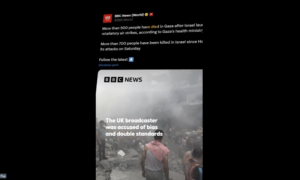To make it easier for you to find your way in the maze of information, we publish a short guide to the most important concepts related to the escalation of military operations in the Gaza Strip and Israel
Gaza Strip
An area inhabited almost exclusively by Palestinians located on the coast of the Mediterranean Sea, bordering Egypt in the southwest, and mostly Israel. Gaza is governed by Hamas which won elections in 2006 and took control of it in 2007. This event resulted in the Israeli blockade of the flow of trade goods making it difficult for residents to have access to water, electricity, and medicine. Over two million people live in the small area of the Zone measuring 360 square kilometers.
What is the history of the Gaza Strip? In short, the years 1922-1948 were the time of the Palestine Mandate and British rule in this area. Israel was established in 1948 as a result of the division of historical Palestine into the newly established Israeli state and the area controlled by Arab states. As a result of the wars, the Palestinian area, i.e. the West Bank and the Gaza Strip, have been under Israeli occupation for several decades. Jerusalem is also divided into Israeli and Palestinian areas.
The years after Hamas took power are the time when this group and other militants from the Strip fire thousands of rockets into Israel, and, in response, Israel also launches a series of military operations in Gaza: an air campaign and a ground invasion in late 2008 and early 2009, a major bombing campaign in 2012 and another air-ground attack in the summer of 2014. For 15 years Palestinians in the Strip have been struggling with problems with access to electricity, water, and health care, and with a collapsing economy. They are also unable to travel freely to other parts of Palestine.
In connection with the events of 7 October, and in response to the Hamas attack, Israeli Defense Minister Yoav Gallant announced a complete blockade of the Gaza Strip.
Hamas
It is a Palestinian military group which governs the Gaza Strip independently of the Palestinian Authority, and is considered a terrorist organization, among others, by the USA and the European Union. The name of this Islamic resistance movement means ‘zeal’ in Arabic. Hamas was founded in Gaza in 1987 shortly after the beginning of the First Intifada, i.e. Palestinian uprising, as a branch of the Muslim Brotherhood.
Since taking power in 2007, after a short war with Fatah forces loyal to President Mahmoud Abbas, head of the Palestinian Authority and the Palestine Liberation Organization, the group has fought several wars with Israel. The group’s goals include replacing the Israeli state with an Islamic state. Hamas has the blood of many innocents on its hands, and has attacked not only Israeli soldiers, but also settlers and civilians, both in the occupied territories and in Israel.
At the same time, the group also supported the victims of the Israeli occupation allocating its money for aid and thus gaining support among the residents. It is worth emphasizing, however, that many Palestinians do not support Hamas’s brutal actions and violence. On 7 October 2023 Hamas attacked Israel firing rockets into it, destroying part of the dividing fence, and sending its fighters into Israeli territories along the border with Gaza. Hamas is supported, among others, by Iran, Syria, and Lebanese Hezbollah.
Zionism
The Israeli social and political movement with many branches currently striving to maintain the State of Israel in the territories of ancient Israel, combining Jewish identity with national identity. The actions of this movement led to the establishment of the State of Israel in 1948.
Deriving their nationality from the biblical kingdoms of David and Solomon existing around 950 BC, the Zionists tried to regain Zion, i.e. the lands of the chosen nation described in the Bible, including Jerusalem.
Modern Zionism has its origins in the 19th century when national identities were being formed in Europe. Its creator is considered to be the Austrian-Jewish journalist Theodor Herz. Experiencing images of anti-Semitism with his own eyes, he came to the belief that the Jewish nation would not be safe until it settled in its own country. His essays and the theses presented in them caused people to start leaving Europe for the territories of today’s Israel.

Among today’s Zionists everyone agrees on the existence of the State of Israel, but there are different visions of its governance. The Zionist left (dominant in Israel until the 1970s) is willing to exchange Israeli-controlled lands for peace with Arab states, seeks greater government interference in the economy, and favors secular over religious government.
In turn, the Zionist right that is currently in power is skeptical of the ‘land for peace’ position, economically libertarian, and willing to combine religion with politics. Arabs and Palestinians see Zionism as a form of colonialism, because it gives Jews privileges that other nations cannot receive.
For example, any Jew living outside the State of Israel can obtain its citizenship. In 1975 Arab states pushed through a UN resolution recognizing Zionism as ‘a form of racism and racial discrimination’, but the decision was repealed 16 years later.
Jerusalem
The city important for three religions: Judaism, Christianity and Islam. Sacred places in the city include: The Wailing Wall – the wall of the ancient Jewish temple, the Al-Aqsa mosque built in the 7th century, and the Dome of the Rock. Today, Israel recognizes Jerusalem as its undivided capital, and such status is not recognized, among others, by the UN. The Organization’s Security Council Resolution 478 condemns Israel’s decision to annex East Jerusalem as a violation of international law and calls for a compromise solution.

Palestinians would also like Jerusalem to be their capital. Due to the dispute, the city is divided into two parts: western – Israeli and eastern – Palestinian. East Jerusalem is de facto annexed and the official process of Judaization of the area is underway, and Palestinians are dispossessed.
West Bank
Part of Palestine de facto controlled by Israel, inhabited by almost 3 million Palestinians. Israel took control of the territory in 1967 replacing Jordan and allowing the construction of Jewish settlements. Palestinians and the vast majority of the international community consider these actions unlawful and the occupation of Palestinian land illegal.
However, this is not a matter of majority opinion, but a legal fact: these actions are indeed inconsistent with international humanitarian law. The Geneva Convention prohibits the transfer of the occupying power’s civilian population into the occupied territory. Meanwhile, approximately 500 thousand Israeli settlers currently live in the West Bank. As the UN warned in June, Israeli security forces have killed at least 126 Palestinians in the occupied West Bank this year.
Translated by Wojciech Rozner.



